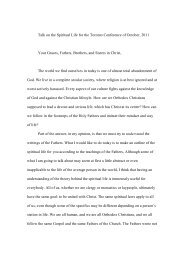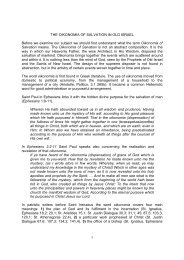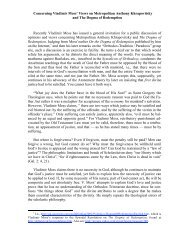The Apostolic Church by Fr. Panagiotes Carras - Saint Nektarios ...
The Apostolic Church by Fr. Panagiotes Carras - Saint Nektarios ...
The Apostolic Church by Fr. Panagiotes Carras - Saint Nektarios ...
You also want an ePaper? Increase the reach of your titles
YUMPU automatically turns print PDFs into web optimized ePapers that Google loves.
Christian faith was planted. As early as a.d. 58 St. Paul could say: <strong>Fr</strong>om Jerusalemand round about even unto Illyricum, I have fully preached the gospel of Christ (Rom.15:19). He afterwards carried it to Rome, where it had already been known before, andas far as Spain, the western boundary of the empire.<strong>The</strong> nationalities reached <strong>by</strong> the Gospel in the first century were the Jews, the Greeks,and the Romans, and the languages used were the Hebrew or Aramaic, and especiallythe Greek, which was at that time the organ of civilization and of internationalintercourse within the Roman empire.St. Luke in the Book of Acts records the heroic march of Christianity from the capital ofJudaism to the capital of heathenism with the same artless simplicity and serene faithas the Evangelists tell the story of Jesus; well knowing that it needs no embellishment,no apology, no subjective reflections, and that it will surely triumph <strong>by</strong> its inherentspiritual power.<strong>The</strong> Acts and the Epistles of St. Paul accompany us with reliable information down tothe year 63. A few years afterwards followed the destruction of Jerusalem, which musthave made an overpowering impression and broken the last ties which bound JewishChristianity to the Jewish nation. <strong>The</strong> event is indeed brought before us in the prophecyof our Saviour as recorded in the Gospels, but for the terrible fulfillment we aredependent on the account of Josephus, an unbelieving Jew, which, as the testimony ofan enemy, is all the more impressive.At the time of the conversion of Constantine, in the beginning of the fourth century, thenumber of Christians may have reached ten or twelve millions, that is about one-tenth ofthe total population of the Roman Empire. <strong>The</strong> rapid growth of the <strong>Church</strong> under themost unfavorable circumstances was miraculous. It was achieved in the face of anindifferent or hostile world, and <strong>by</strong> purely spiritual and moral means, without shedding adrop of blood except that of its own innocent martyrs.Signs and wonders and extraordinary demonstrations of the Grace of the Holy Spirit, forthe conversion of unbelieving Jews and heathens, attended the entrance of the <strong>Church</strong>into the pagan world. It took up its permanent abode with our fallen race, to transform itgradually, without war or bloodshed, <strong>by</strong> a quiet, leaven-like process, into the People ofGod. Modest and humble, lowly and unseemly in outward appearance, without silver orgold, but rich in gifts of the Holy Spirit, strong in faith, fervent in love, and joyful in hope;bearing in earthen vessels the imperishable treasures of heaven, it presented itself to allthe nations of the earth as the only road to the Kingdom of God. At first an insignificantand even contemptible sect in the eyes of the carnal mind, hated and persecuted <strong>by</strong>Jews and heathens, the Faith of the Christians confounded the wisdom of Greece andthe power of Rome, soon planted the standard of the Holy Cross in the great cities ofAsia, Africa, and Europe, and proved itself the hope of the world.<strong>Saint</strong>s Peter, Paul, and John stand out most prominently as the chosen Three whoaccomplished the great work of the <strong>Apostolic</strong> Age, and exerted, <strong>by</strong> their writings and





